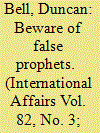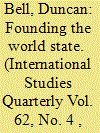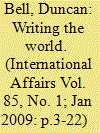|
|
|
Sort Order |
|
|
|
Items / Page
|
|
|
|
|
|
|
| Srl | Item |
| 1 |
ID:
069772


|
|
|
| 2 |
ID:
163284


|
|
|
|
|
| Summary/Abstract |
Herbert George Wells was one of the leading public intellectuals of the first half of the twentieth century. Most famous today as a founder of modern science fiction, he was once known throughout the world as a visionary social and political thinker. Questions of global order occupied a central place in his work. From the opening decade of the century until the close of the Second World War, he campaigned tirelessly for the creation of a world state, which would act as a guarantor of universal peace and justice. Yet, scholarship on Wells pays insufficient attention to the complex and conflicted nature of Wells's early views about how to build a world state. In particular, it neglects the tensions between his advocacy of a New Republic, formed by the unification of the English-speaking peoples, and his support for liberal imperialism. I analyze the development of this theme in Wells's political thinking during the years before WWI, a formative period in his intellectual life. I demonstrate how his conceptions of race, empire, and Anglo-American union shifted over time, show how his political arguments connected to his underlying views about social explanation and language, and highlight how his interpretation of the United States profoundly influenced his ideas about world order.
|
|
|
|
|
|
|
|
|
|
|
|
|
|
|
|
| 3 |
ID:
093578


|
|
|
|
|
| Publication |
2010.
|
| Summary/Abstract |
Recent scholarship on John Stuart Mill has illuminated his arguments about the normative legitimacy of imperial rule. However, it has tended to ignore or downplay his extensive writings on settler colonialism: the attempt to create permanent "civilized" communities, mainly in North America and the South Pacific. Mill defended colonization throughout his life, although his arguments about its character and justification shifted over time. While initially he regarded it as a solution to the "social problem" in Britain, he increasingly came to argue that its legitimacy resided in the universal benefits-civilization, peace, and prosperity-it generated for humanity. In the final years of his life Mill seemed to lose faith in the project. Finally recognizing the prevalence of colonial violence and the difficulty of realizing his grand ambitions, yet refusing to give up on colonization altogether, his colonial romance gave way to a form of melancholia
|
|
|
|
|
|
|
|
|
|
|
|
|
|
|
|
| 4 |
ID:
120443


|
|
|
|
|
| Publication |
2013.
|
| Summary/Abstract |
Questions of race and racism have haunted the imagination of international relations (IR) since its inception. The essays in this special section probe assorted dimensions of the story, elucidating important though often overlooked ways in which racial difference is figured in global politics.
|
|
|
|
|
|
|
|
|
|
|
|
|
|
|
|
| 5 |
ID:
086937


|
|
|
|
|
| Publication |
2009.
|
| Summary/Abstract |
In order to grasp some of the key intellectual developments and trends that shaped the global politics of twentieth century and continue to shape our own world-neo-classical economics, modernization theory, deterrence theory, the democratic peace, among others-it is necessary to explore the history of the human sciences. It is important, in other words, to examine the role of the modern research university in producing and diffusing ideas about the self, society, the economy and world order. International Relations (IR), and political science more generally, played a significant role in this story. In recent years we have seen a growth of interest in the history of IR, though it is still an underdeveloped area of research. Among other things, scholars have shown that many of the foundational myths of the discipline-the views that inform textbook understandings of the past and present-are deeply flawed. This article first surveys this recent work, highlighting its strengths and weaknesses, and then proceeds to offer some thoughts on future directions for research. It identifies a range of questions and topics that have yet to be adequately addressed, and draws on the latest methodological work in intellectual history, highlighting some new interpretative approaches that can enrich scholarship in this area.
|
|
|
|
|
|
|
|
|
|
|
|
|
|
|
|
|
|
|
|
|